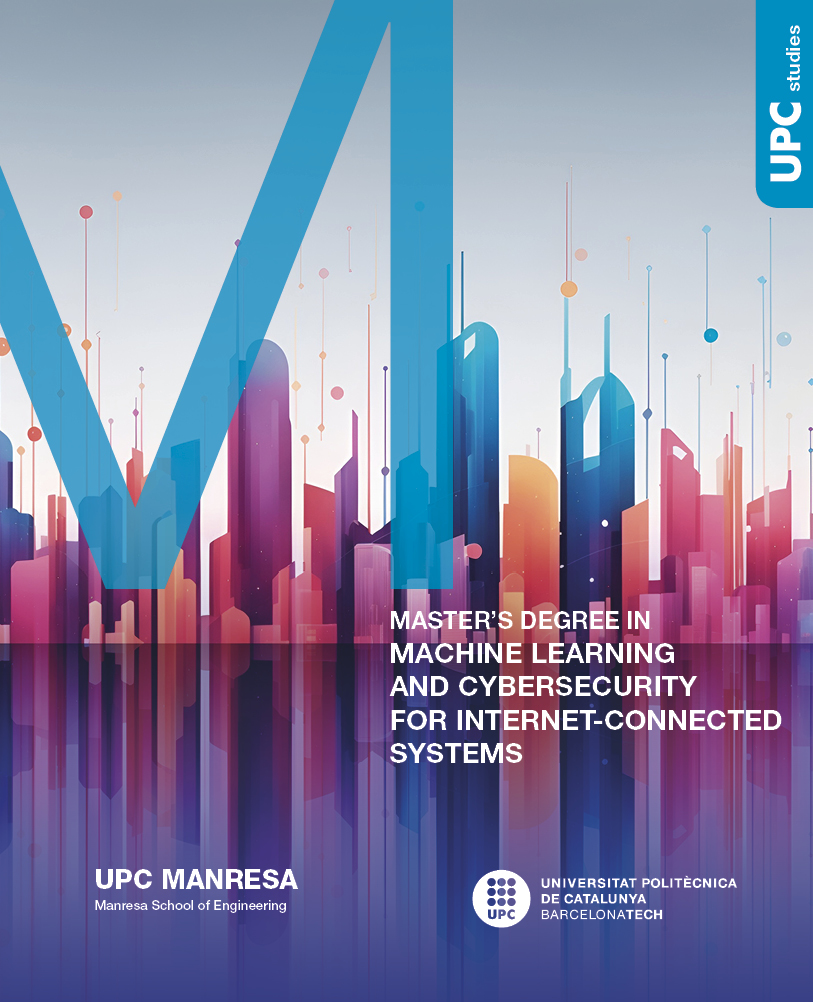
Master's degree in Machine Learning and Cybersecurity for Internet-Connected Systems
Manresa School of Engineering (EPSEM)
The master’s degree in Machine Learning and Cybersecurity for Internet-Connected System (master's degree website) aims to provide advanced and specialised scientific and technological training in artificial intelligence and cybersecurity, with an emphasis on their application in internet-connected systems, including computer systems of differing degrees of complexity in general and Internet of Things systems in particular. The aim is thus to cover the current shortage of professionals who have this kind of training, which is highly valued in industry and in research in ICT technologies.
This master's degree is organised within the framework of the European MERIT project, through the funding of the Digital Europe programme, in collaboration with three European universities, SMEs, digital innovation hubs and research centres. The European project provides funding such as student grants.
This master's degree is organised within the framework of the European MERIT project, through the funding of the Digital Europe programme, in collaboration with three European universities, SMEs, digital innovation hubs and research centres. The European project provides funding such as student grants.
- Duration and start date
- 1.5 academic years, 90 ECTS credits
- Timetable and delivery
- Face-to-face
- Fees and grants
- Approximate fees for the master’s degree, excluding other costs (does not include non-teaching academic fees and issuing of the degree certificate):
€1,743 (€4,050 for non-EU residents ).
More information about fees and payment options
More information about grants and loans - Language of instruction
- English
Information on language use in the classroom and students’ language rights.
- Location
- Manresa School of Engineering
- Official degree
- Recorded in the Ministry of Science, Innovation and Universities
- General requirements
- Academic requirements for admission to master's degrees
- Specific requirements
- Candidates in possession of one of the following bachelor's degrees (or equivalent) are granted admission to the master's degree without having to take bridging courses:
- Bachelor’s degree in ICT Systems Engineering
- Bachelor's degree in Informatics Engineering
- Bachelor’s degree in Data Science and Engineering
- Bachelor’s degree in Telecommunications Systems Engineering
- Bachelor’s degree in Telecommunications Technologies and Services Engineering
- Bachelor’s degree in Network Engineering
- Bachelor's degree in Industrial Electronics and Automatic Control Engineering
- Bachelor's degree in Industrial Technology Engineering
- Bachelor’s degree in Electrical Engineering
- Places
- 30
- Pre-enrolment
- Pre-enrolment period open.
Expected deadline: 04/09/2026.
How to pre-enrol - Enrolment
- How to enrol
- Legalisation of foreign documents
- All documents issued in non-EU countries must be legalised and bear the corresponding apostille.
First semester
Second semester
- Advanced Deep Learning Modes 3
- Cyberphysical Systems 3
- Iot Connectivity 3
- Sequences and Recurrent Networks 3
- Wireless System Security 3
- Advanced Cryptography 3
- Ai in Healthcare 3
- Digital Forensics 3
- Ethical, Legal and Human Aspects of Ai and Cybersecurity 3
- Introduction to High Performance Computing 3
- Natural Language Processing 3
- Optimisation for Machine Learning 3
- Probabilistic Methods 3
- System Development Lifecycle: Analysis and Design 3
- System Security 3
Third semester
- Advanced Relational Database Systems 3
- Cybersecurity of Industrial Control Systems 3
- Database Security 3
- Digital Entrepreneurship and Innovation Management 3
- Front End Frameworks 3
- Iot Sensor Systems 3
- Machine Learning for Cybersecurity 3
- Network Security Monitoring 3
- Network Solutions for Iot 3
- Master's Thesis 18
- CompulsoryECTS
- OptionalECTS
- ProjectECTS
Professional opportunities
- Professional opportunities
- Intelligent software developer.
- Specialist in artificial intelligence.
- Cybersecurity consultant and analyst.
- Security manager in tech companies and ICT departments.
- Data scientist and engineer.
- Internet of Things engineer.
- Researcher at innovation and development centres.
- Teaching and/or research staff at universities.
- Competencies
-
Generic competencies
Generic competencies are the skills that graduates acquire regardless of the specific course or field of study. The generic competencies established by the UPC are capacity for innovation and entrepreneurship, sustainability and social commitment, teamwork, proper use of information resources, knowledge of a foreign language (preferably English) and gender perspective.
- UPC school
- Manresa School of Engineering (EPSEM)
- Academic calendar
- General academic calendar for bachelor’s, master’s and doctoral degrees courses
- Academic regulations
- Academic regulations for master's degree courses at the UPC
Info
Master's degree in Machine Learning and Cybersecurity for Internet-Connected Systems
Manresa School of Engineering (EPSEM)
- Day
- 09/05/2026
- Time
- 12:00 h
- Location
- Escola Politècnica Superior d'Enginyeria de Manresa (EPSEM)
- Manresa
- More information
- Face-to-face information session. Registration
Info
Master's degree in Machine Learning and Cybersecurity for Internet-Connected Systems
Manresa School of Engineering (EPSEM)
- Day
- 17/06/2026
- Time
- 18:00 h
- More information
- Virtual information session. Registration
Pre-enrolment
Pre-enrolment for this master’s degree is currently closed.
Use the “Request information” form to ask for information on upcoming pre-enrolment periods.



